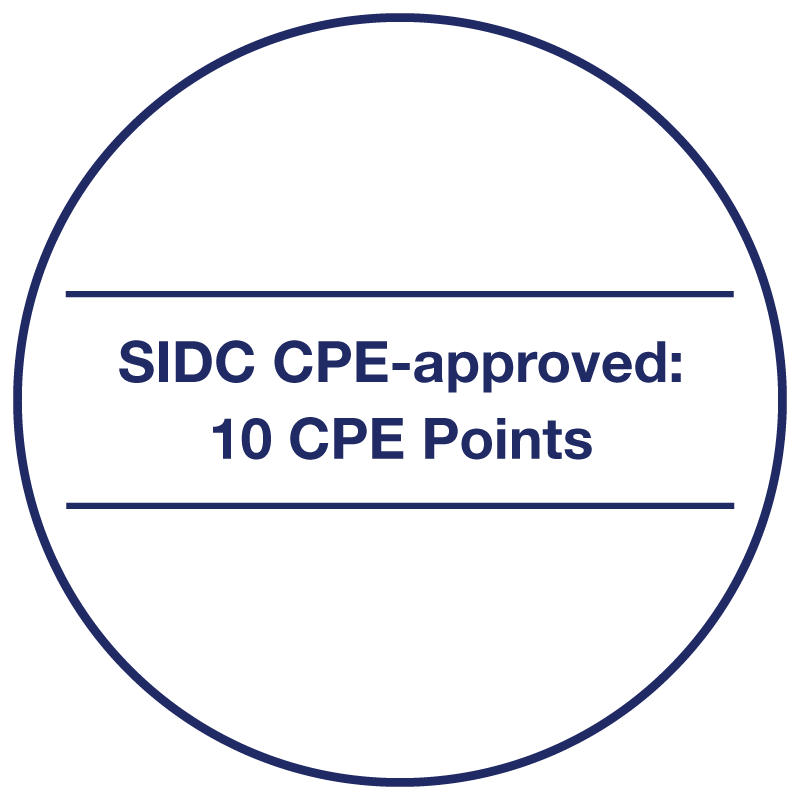Fee per participant: RM5,900/$1,950
Discounts are available for group bookings. Please contact us for more details.

Integrated Stress-testing for Financial Institutions: Credit, Market, Operational & Liquidity Risks
SIDC CPE-approved: 10 CPE PointsDate: 13th & 14th May 2024
Venue: DoubleTree by Hilton Kuala Lumpur
Hands-on Course
Stress-testing is essential to banks and regulators. It forms the backbone of a bank’s ICAAP (Internal Capital Adequacy Assessment Process), and answers a simple question: can a bank survive extreme but plausible scenarios which adversely impact its profitability, liquidity, or capital adequacy? However, stress-testing is complicated. It requires an integrated approach that first deals with how scenarios should be selected and calibrated, and then how to translate these scenarios into their resulting financial impact whilst respecting the various interrelationships between different types of risks.
This course has been designed for practitioners who need to understand how to implement and/or improve stress-testing frameworks in their banks. Since credit risk is central to the business models of most financial institutions, the course starts by taking a deep-dive into building an evolution of PDs (probabilities of default) based on stress-scenario severity, and then translating scenario parameter values into financial impact using the staging rules of IFRS9. Stress-testing for market risk is explored using numerical illustrations of how losses arise from different exposures, including interest-rate risk in the banking book, FX exposures, equity portfolios, and bond investments. For operational risk stress-testing, the course details how to capture high-frequency low impact events as well as low-frequency high impact events; liquidity risk stress-testing explains how to link an inability to refinance funding liabilities to balance sheet weakening when credit conditions deteriorate; ESG stress-testing is also included.
The course provides significant opportunities for discussion and questions and is aided most importantly by clear illustrations, quizzes, and numerical calculations undertaken by delegates to assist in learning an array of different methodologies and techniques that can be immediately applied in practice. Attendees should expect to bring laptops and work through cases and numerical models as a key part of the course.
Attendees should please bring with them a laptop loaded with a recent version of MS Excel. Prior to the course the course director will construct a spreadsheet that will be downloadable from the REDmoney website. This spreadsheet will contain separate tabs for each exercise featured in the course, including the integrated case study. Within those tabs will be data. For example, starting balance sheet plus stress scenarios in terms of the evolution of GDP, plus other statistics. Attendees will be required to apply the scenarios to evaluate the impact of stress for the various dimensions of risk we are studying: credit, market, operational and liquidity risk.
Fee per participant: RM5,900/$1,950
Discounts are available for group bookings. Please contact us for more details.
If you are looking for an in-house training program or wish to send a group to an existing public program, kindly please contact Andrew Tebbutt at [email protected] or +603 2162 7802.
Learn More

Send me Details
For enquiries please contact:
Normariya Sariman
Account Manager, REDmoney Seminars
[email protected]
Direct Line: +603 2162 7800 ext 44
Ramesh Kalimuthu
Events Sales Director
[email protected]
Direct Line: +603 2162 7800 ext 65
Fax: +603 2162 7810
For sponsorship & speaking opportunities:
Andrew Tebbutt
Managing Director
[email protected]
Direct Line: +603 2162 7802
For marketing and media enquiries
Govina Selvanthran
Marketing Manager
[email protected]
Direct Line: +603 2162 7800 ext 22

Integrated Stress-testing for Financial Institutions: Credit, Market, Operational and Liquidity Risks
SIDC CPE-approved: 10 CPE PointsDate: 13th & 14th May 2024
Venue: DoubleTree by Hilton Kuala Lumpur
Hands-on Course
Send me Details
Stress-testing is essential to banks and regulators. It forms the backbone of a bank’s ICAAP (Internal Capital Adequacy Assessment Process), and answers a simple question: can a bank survive extreme but plausible scenarios which adversely impact its profitability, liquidity, or capital adequacy? However, stress-testing is complicated. It requires an integrated approach that first deals with how scenarios should be selected and calibrated, and then how to translate these scenarios into their resulting financial impact whilst respecting the various interrelationships between different types of risks.
This course has been designed for practitioners who need to understand how to implement and/or improve stress-testing frameworks in their banks. Since credit risk is central to the business models of most financial institutions, the course starts by taking a deep-dive into building an evolution of PDs (probabilities of default) based on stress-scenario severity, and then translating scenario parameter values into financial impact using the staging rules of IFRS9. Stress-testing for market risk is explored using numerical illustrations of how losses arise from different exposures, including interest-rate risk in the banking book, FX exposures, equity portfolios, and bond investments. For operational risk stress-testing, the course details how to capture high-frequency low impact events as well as low-frequency high impact events; liquidity risk stress-testing explains how to link an inability to refinance funding liabilities to balance sheet weakening when credit conditions deteriorate; ESG stress-testing is also included.
The course provides significant opportunities for discussion and questions and is aided most importantly by clear illustrations, quizzes, and numerical calculations undertaken by delegates to assist in learning an array of different methodologies and techniques that can be immediately applied in practice. Attendees should expect to bring laptops and work through cases and numerical models as a key part of the course.
Attendees should please bring with them a laptop loaded with a recent version of MS Excel. Prior to the course the course director will construct a spreadsheet that will be downloadable from the REDmoney website. This spreadsheet will contain separate tabs for each exercise featured in the course, including the integrated case study. Within those tabs will be data. For example, starting balance sheet plus stress scenarios in terms of the evolution of GDP, plus other statistics. Attendees will be required to apply the scenarios to evaluate the impact of stress for the various dimensions of risk we are studying: credit, market, operational and liquidity risk.
Fee per participant: RM5,900/$1,950
Discounts are available for group bookings. Please contact us for more details.
If you are looking for an in-house training program or wish to send a group to an existing public program, kindly please contact Andrew Tebbutt at [email protected] or +603 2162 7802.
Learn More


Dr Ken Baldwin
Former Director, Financial Policies & Planning, Islamic Development Bank
Dr. Ken Baldwin has worked as a practitioner in banking and finance for over 25 years in senior positions spanning the front and middle offices. Having graduated from Oxford University with a first-class honors degree in Physics in 1989, he qualified as a Chartered Accountant with PWC, before joining UBS, and then later Credit Suisse, in derivatives risk and control functions based in London.
He gained a PhD in microeconomics, and worked in the GCC for 15 years in retail and investment banks. Whilst at Abu Dhabi Islamic Bank, Dr. Ken built an ALM analytic technology platform capable of capturing liquidity and interest rate risks inherent in the many varied financing products used at retail and corporate levels. He then moved to take up the position of MENA Regional Head of Quantitative Analysis for Citigroup. At Citicorp, Dr. Ken worked on structuring complex derivatives products used by Gulf-regional corporations to hedge FX and interest rate risks. Still residing in Bahrain, Dr. Ken then joined Investcorp, where he worked on the risk due diligence of corporate private equity and real estate private equity transactions and portfolio management. After leaving Investcorp, he set up the risk management department for venture capital bank, providing Basel III compliance and deal analysis for the bank. He then operationalized a new Islamic investment bank as its Chief Operating Officer for 3 years, before his most recent industry role at the Islamic Development Bank, where he set up and ran a new department tasked with developing financial policies and risk-based pricing of the bank’s Islamic financing products. Dr. Ken is currently an Assistant Professor of Finance in the UK. He has published quantitative finance articles in peer-reviewed academic journals including the Journal of International Financial Markets Institutions and Money, and the Journal of Risk, and during his earlier career, taught CFA and FRM professional certifications as a pastime for the Bahrain Institute of Banking and Finance.


For enquiries please contact:
Normariya Sariman
Account Manager, REDmoney Seminars
[email protected]
Direct Line: +603 2162 7800 ext 44
Ramesh Kalimuthu
Events Sales Director
[email protected]
Direct Line: +603 2162 7800 ext 65
Fax: +603 2162 7810
For sponsorship & speaking opportunities:
Andrew Tebbutt
Managing Director
[email protected]
Direct Line: +603 2162 7802
For marketing and media enquiries
Govina Selvanthran
Marketing Manager
[email protected]
Direct Line: +603 2162 7800 ext 22
